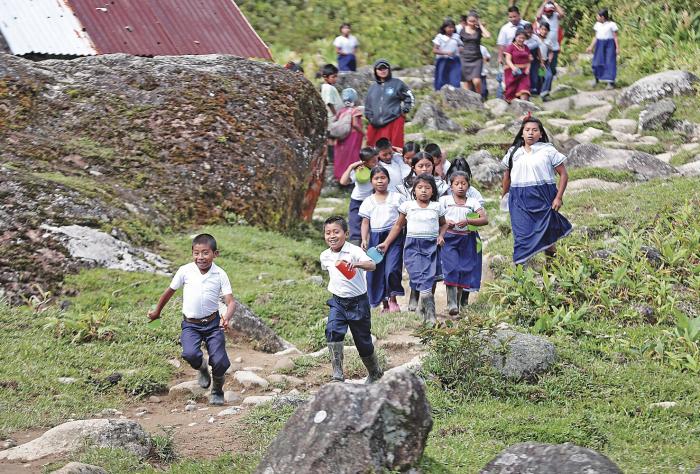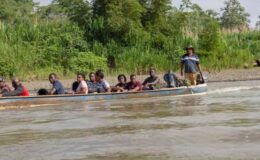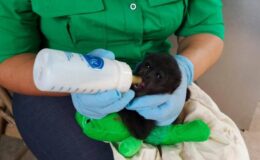The task of educating the bulk of Panama- the indigenous poor.
- By : James Bryson
- Category : Education, Human Interest, Infrastructure

Only with the vigor and impatience that children can show, they eagerly await in their classrooms the call of the teachers to receive their snack for the day. At Quebrada Hacha, the food of knowledge is combined with nutrition to guarantee that students have a future of greater opportunities.
From early hours, the mothers begin preparing the cream of corn in the dining room. This space is a structure with a dirt floor, wooden walls damaged by time and unused stoves that take up space. It is there where the mothers install the pot and light the fire with wood, making it burn at full speed, to prepare food for all the students.
Reynaldo, wait your turn! With this warning, the teacher frustrates the little boy’s intentions of being able to sneak among his classmates. A strategy that is part of the Panamanian idiosyncrasy to be one of the first to receive his cream portion.
After her wait has been rewarded and with her eyes on her full glass, she takes the first sip to her mouth. Her face expresses her happiness when savoring the delicacy that she combines with cookies distributed by the Ministry of Education (Meduca).

Careful teachers become conduits of knowledge for their students to learn and apply their lessons. Spanish, mathematics, religion and many other subjects are taught every day to the infants.
They are children and young people who walk for hours, with rubber boots, so as not to damage their shoes, which they use only when they are in the classroom and from there build mental shelves full of knowledge in the different areas of knowledge.
Education also knows how to adapt to circumstances. Many are the girls who wear the nagua, the traditional dress of the Ngäbe women, made in the color of their uniform. It is their way of being in the educational system alien to their culture, but without losing their identity and traditions.
As noon approaches, the windows of the classrooms are filled with impatient young people who wait for their little tenants to vacate their classroom in the morning so they can enter and teach. The school was small before the more than 300 students between primary and secondary who attend this nest of knowledge. The divided shift has been the solution to serve the students and not allow the opportunity to study to be lost.

Quebrada Hacha also received its modular classroom. The government strategy that seeks to improve infrastructure in areas of difficult access becomes a reality. However, it remains closed. Getting the necessary furniture has been complicated and classes cannot yet be held, according to school authorities. In rhetoric, it seems that the urban has remembered them to improve its structure; but in practice, the school, already with limited resources, has had to pay (with money from the Fund for Equity and Quality of Education, Fece) for the acquisition of the modern room.
Germán Green, director of the educational center, expresses with uneasiness his discomfort at not receiving financial aid to improve the infrastructure. Choosing between the modular classroom and computer equipment, boards or more repairs is the reality of this educational community. Meanwhile, and waiting for them to open their modern classroom and give classes, the eighth grade students remain busy being freighters, a trade that is almost the general rule of the town.
young freighters
Do you need me to carry cargo, your suitcases or the purchase? Cargo men and women can do that for you. Accustomed to long journeys, they make a living carrying up to 100 pounds on their shoulders. For hours, between stony trails and crossing rivers, they can earn from $3.00 to $30.00. Being a freighter is something that is in high demand, but even so, there are mothers who decide to send their nephews instead of their own children.

At the other levels of education, classes are running normally thanks to the good weather. On the other hand, when it rains and because there is no access to electricity, the classrooms become dark and the noise of the raindrops hammering on the roof makes it impossible to hear the lesson.
Professor Cecilia Montenegro, who teaches geography and history, witnesses how it becomes impossible for her to teach classes when the downpour causes a channel of water to leak through the students’ chairs, forcing them to move away so as not to get wet.
The gaps in education are abysmal. When their urban contemporaries are trying to solve complex algebra problems, there are seventh-graders in the county who still can’t read or write. However, teachers with a vocation are committed to their students and give them the tools that are within their reach.
In Quebrada Hacha it is evident that the population pyramid leans towards young people. The norm, are entire families in which future engineers, doctors, teachers and lawyers are growing and playing, but only if given the opportunity. In this community, you don’t just live between being a freighter, going to school and getting a snack to complement your diet. It will be a utopia, but more than an hour from the nearest road, there is today and tomorrow of our country.



No Comments